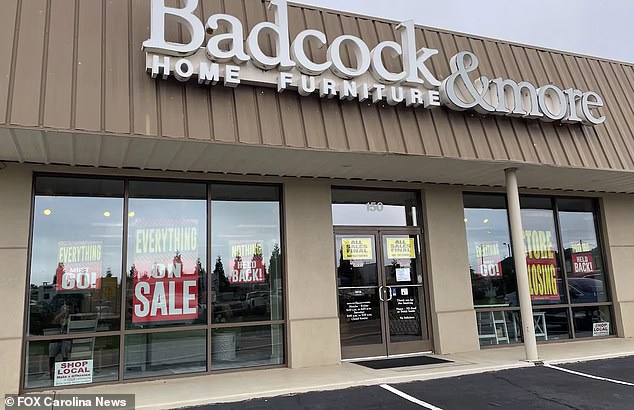Home Depot rival to shut all 442 stores across 47 states after going bankrupt – but will have huge clearance sale first
LL Flooring — formerly known as Lumber Liquidators — is closing all of its stores after filing for bankruptcy after three decades in business.
The retailer, oone of America’s largest flooring suppliers, was looking for a buyer after filing for bankruptcy.
Earlier in the summer, it had 442 stores but closed nearly 100 as it sought to cut costs and attract investors, but failed to find a buyer.
In a letter to customers yesterday, bosses wrote: ‘It is with a heavy heart that we have to inform you that we are going to begin the process of winding down the business and closing all of our stores.’
LL Flooring will now sell its stock in the remaining stores’ closing down sale, which will begin tomorrow and last for approximately 12 weeks. Approximately 2,000 people will lose their jobs.
LL Flooring, which operates 442 stores in 47 states, is considering Chapter 11 bankruptcy, Bloomberg reported
All existing orders will be fulfilled within 30 days, including those awaiting installation. However, it will no longer offer installation to anyone who purchases flooring on sale.
The retailer, which specializes in hardwood flooring, has struggled with declining sales over the past year as families cut back on home renovations.
It’s not the only DIY and furniture chain to be hit. White goods retailer Conn’s HomePlus is closing all of its 170-plus stores.
Meanwhile, Badcock Home Furniture & More said in July it would close all 380 stores the 120-year-old retailer was based in the southern U.S.
LL Flooring filed for Chapter 11 protection on August 11 and immediately closed 94 stores to save costs and make the company attractive to a buyer.
Chapter 11 offers companies the opportunity to continue operating while they figure out how to cut costs and renegotiate with companies they owe money to.
After news broke last month that LL Flooring was in financial trouble, customers took to Reddit.
“People are mortgaged to the brim with properties that need maintenance. They can’t afford the upgrades right now,” one person wrote.
Tom Sullivan founded Lumber Liquidators in 1994 by purchasing surplus lumber from companies and reselling it at a discount.
The company initially did business out of the back of a pickup truck in Stoughton, Massachusetts.
Shortly thereafter, Sullivan began negotiating directly with the factories, seeking to cut out the wholesalers who acted as middlemen and to undercut the competition by charging lower prices.
Sullivan celebrated its 20th anniversary in 2014 and said at the time, “Looking back and seeing how far we’ve come in 20 years is almost a dream.
‘We’ve grown from a small company to one that serves over two million people, and in the process, we’ve changed the way hardwood flooring is sold.
“Our customers know that the value and quality of their floors are unmatched.”
Sullivan left the company in 2017 and has since fallen out with the board, having tried to take over the company but thus far been rebuffed.
In 2020, Lumber Liquidators changed its name to LL Flooring.
LL Flooring’s troubles come amid widespread “retail apocalypse,” with stores struggling with declining foot traffic and increasingly tight margins.
In the first four months of 2024, there were almost 2,600 store closuresIf this trend continues, nearly 8,000 people will have died by the end of the year.
Last week, it was announced that Big Lots, which has already closed a quarter of its 1,400 stores, is on the brink of bankruptcy. The news sent shares plummeting 50 percent.
In recent months, Walmart has closed three more of its underperforming locations, while Best Buy closed ten in march.

Badcock is another DIY store that has had financial problems. It had more than 380 stores in Florida, Alabama, Mississippi, Tennessee, North Carolina, South Carolina, Georgia and Virginia – all of which are closing on an unknown date

LL Flooring is the largest specialty flooring company in the US
Dollar stores have also been hit hard: 99 Cents Only announced in April that it would close all 371 of its locations in California, Texas, Arizona and Nevada.
The 1,000 closures of Family Dollar and its sister company Dollar Tree will take place over the next three years.
Express, a well-known mall-based retailer, filed for bankruptcy in April and said it would close 95 Express locations, in addition to all of its UpWest stores.
In early May, Rue21, the teen fashion chain that is a fixture in malls across America, also announced that it would close all of its 543 U.S. stores after filing for bankruptcy.
